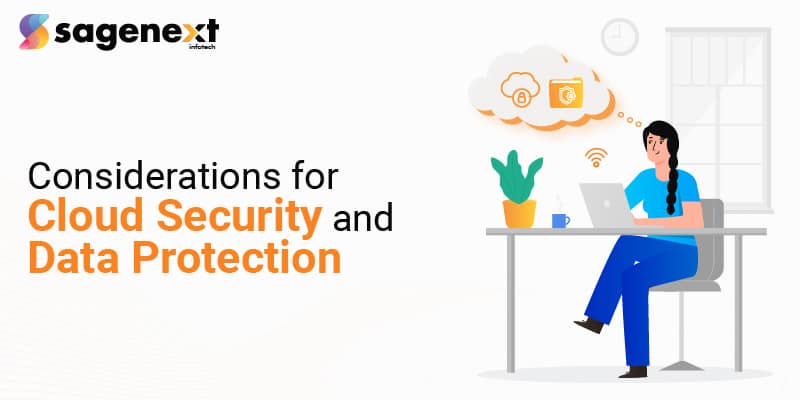
Considerations for Cloud Security and Data Protection
Cloud computing has been one of the most revolutionary technologies in the IT industry ever since it came into being. It has transformed the way businesses deliver their services in modern times. When most of the world is still behind closed doors amidst this pandemic, the cloud has proved to be a protective shield, making sure businesses operate smoothly, without compromising their productivity by one single bit. It has been the antibody protecting modern enterprises from the deadly effects of the novel coronavirus.
The cloud has helped the corporate world efficiently transition to the situation-demanded work-from-home culture from its sophisticated, tech-savvy workplaces.
The on-demand, remote access to all the computing resources it provides, has been one of the most defining factors in the aggressive growth of cloud computing in the recent past. From e-commerce to accounting, there are a great many cloud-based solutions that make life a lot easier for both the creators as well as the consumers. Other than dedicated cloud applications, businesses also have the option to choose from any of the private, public, or hybrid clouds to move their data and computing resources to the cloud.
The following are some of the major benefits that the cloud brings to the fore:
- Cost-efficiency due to an inexpensive cloud-based IT infrastructure
- Live data access from any geographical location resulting in flexible work culture
- Easier scalability option
- Enhanced data security
- Better collaboration and integration opportunities
- Advanced data backup capabilities
- Competitive edge
- Access to automatic software updates

“A survey by Datometry has revealed that cost-cutting is the topmost reason why enterprises are embracing the cloud at such a record pace. The list further mentions the opportunity cloud computing offers enterprises to incorporate new features and business capabilities as another driving factor.”
Importance of Data Privacy and Security in the Cloud
The privacy and security of the data on the cloud are of utmost importance. They need as much attention as the cost-efficiency or flexibility of the cloud. One often overlooks the vulnerabilities involving cloud computing while moving to the cloud or using cloud-based tools. It may prove to be disastrous as a mere breach in data security can lead to a huge loss in business in terms of capital as well as business reputation. It may also lead to serious legal and operational consequences.
It is true that the cloud is considered to be a more secure and safer infrastructure compared to a physical, on-site IT infrastructure, given all the advanced measures that the cloud service providers take. However, it is equally important for a cloud user or an enterprise moving to the cloud, to regularly inspect the security measures and make sure everything is in place as far as the data protection is concerned.

The present-day cybercriminals are always glued to their systems, using advanced phishing and malicious tools to spread malware and get access to important company data. They are always on the lookout to explore even the slightest security flaw.
“The University of Maryland claims that there are more than 2244 cyber-attacks happening every day, with an attack taking place about every 39 seconds.”
The following are some of the key factors that lead to security breaches and data loss:
-
Insecure Interfaces and APIs –
Application Programming Interface is an excellent tool that enables cloud users to connect and communicate with other applications and businesses. However, an API with insufficient security often leads to a security breach.
-
Unauthorized Access –
Inadequate data access permissions end up giving data access to unauthorized employees in an organization which further leads to accidental, or in some cases, even intentional data leakage or deletion. It also increases the chances of unauthorized access by a person outside the organization leading to account hijacking.
-
Human Errors –
Human errors are one of the biggest causes of data breaches. They account for about 52 percent of the fundamental causes leading to security threats. Using weak passwords, sharing account credentials with an unauthorized person, accidentally sending sensitive data to unofficial recipients, and falling to scandalous phishing scams, etcetera are some of the popular human errors that result in a privacy or security breach.
-
Data Replication –
Most of the time users are unaware of the physical location of their data. This often leads to unauthorized replication of their data.
It is essential for cloud users to understand the gravity of data security and protection in order to gain immunity against the discussed key causes of data security breaches.
Considerations for Cloud Security and Data Protection
Given the global, competitive business setup, it is very important for enterprises to make the best use of available opportunities and resources to get an edge over their counterparts. Hence, adopting the cloud is inevitable for any organization aiming to expand its business, improve the quality of their services, and achieve higher efficiency and profitability. The aforementioned data security threats can naturally make one skeptical about the adoption of the cloud, but there are measures and security strategies that neutralize these threats.

The following are the cloud security considerations that can be used to counter all sorts of security and data protection menaces:
1) Employee Training and Awareness Program
Lack of data security awareness may lead to human errors which, as discussed earlier, are the biggest security threats for a company. Clearly communicating the business security policies and teaching employees how to identify and counter security attacks help an organization significantly reduce the chances of data breaches.
2) Governing Data Access
Regularly certifying data privileges and monitoring data access help enterprises recognize the anomalous activities in their initial stages. These measures also help an organization better understand the security aspects revolving around the data access permissions.
3) Data Encryption
Data encryption is one of the best strategies to protect your sensitive data in the cloud. This method involves data conversion to a non-readable encoded form that can only be read after decryption. Even if someone gets their hands on the encrypted data, it is meaningless for them until they have the decryption key to translate the data back to the readable format.
Today, you have the option of using encrypted cloud services that offer local encryption and decryption in addition to storage and backup. It limits even the service providers from accessing the information and data files on the cloud.
4) Multi-factor Authentication
Multi-factor Authentication (MFA) is a security strategy that involves two or more attestation factors. An authorized user is given access to data, applications, accounts, or other computing resources of the organization only after providing two or more pieces of verification. One of the most popular MFAs is a two-step verification method where a user is required to enter a one-time password, sent to the user’s registered mobile number or email, after entering the login password. It is an effective strategy that safeguards businesses from illegal access, even when the access credentials are known to the attackers.
5) Flexible Deployment Models
Many of the public cloud service providers give insubstantial deployment options that lack security features. They rather focus on large volumes, not data security and protection. Using flexible deployment models consisting of multiple cloud options including public, private, and hybrid clouds, reduce security threats as well as compliance concerns.
6) Regular System Updates
Consistently upgrading and patching of systems and applications enhances the security of the cloud platform. Organizations must keep an eye on the latest software updates and existing market trends to identify security gaps in both cloud applications as well as installed systems.
7) Advanced Networking Options
Using an advanced network that ensures reliable and secure transmission of data and offers adequate network security alongside a dedicated VPN ( Virtual Private Network), reduces data security risks.
8) Data Backup and Recovery
Choosing a cloud service provider that offers sophisticated data backup and recovery options is extremely important today. If your service provider doesn’t offer the backup capabilities then you must immediately choose a third-party cloud backup plan to ensure your data is safe and easily recoverable in an event of data loss due to some unfortunate event.
Considering the above-mentioned security strategies can help you safeguard your important business and private data which otherwise is quite vulnerable in modern times. Taking such proactive measures enables you to enjoy the boundless benefits of cloud computing without worrying about the security and protection of your data stored in the cloud.







